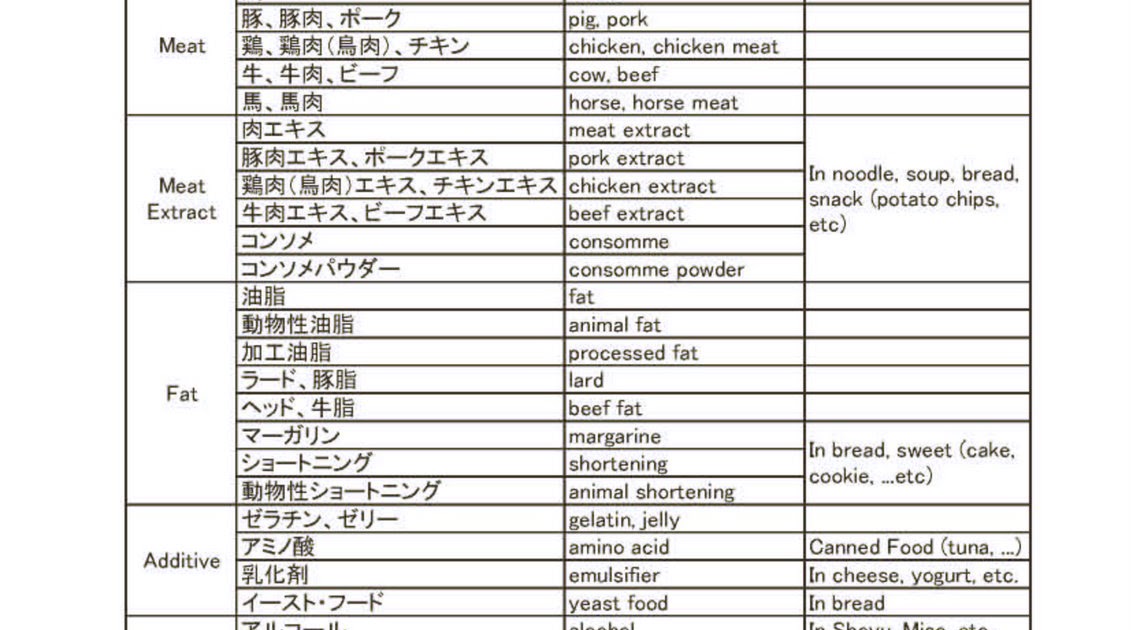Halal Haram List Of Ingredients To Avoid

To help with your halal eating and drinking, check ingredient lists. With the complications of manufacturing and food production, it's hard for Muslims to know what goes into the food we eat. Most Muslims know to look out for pork, alcohol, and gelatin on ingredient labels.
Since the early 1900s the food industry has undergone major advances that have led to more than half of the shelves in a modern supermarket being stocked with packaged and processed foods. These boxed, canned, and frozen foods achieve their convenience by using a number of food ingredients and processing aids.
The original sources and the details of their processing prior to inclusion in the final food product are not provided to consumers but will determine their acceptability for both halal and kosher food production. While additives are generally declared on a product label, processing aids are not shown on the ingredient statement and thus the consumer is not even aware of their presence. Some additives can be legally grouped into generic categories (such as spices) that also make it difficult for consumers to determine what exactly is in the products they buy and how these products have been processed.
Nostale Uk Wood Mini Game Win RokasX298 259. 27 May 16 10:55. [Tutorial] Bot Nostale Multi Features Almaftuchin 1,452. Nostale Hack Nostale Cheats Finally we are back into business and here comes one of the most requested latest Nostale Hack that can. Nostale mini game bot program free. Nostale Minigame Bot Download >>> DOWNLOAD (Mirror #1) nostale minigamenostale minigame guidenostale minigame botnostale mini game hacknostale mini game bot 2015nostale mini game reputationmini game hack nostale downloadnostale mini game hack 2015nostale fishing mini game botnostale minigame preminostale minigame hacksnostale mini games belohnungennostale mini game bug 0fea0b1dc0 NosHacks.die. Exp-Bot and Multihack v1.4 nostale game! And the game gets better! Play Game Hacker| Working hacks and games The best hacks and games! Through this program. May 18, 2017 Even the scrooges will smile at 3 free months of ad-free music with YouTube Red.
Thus, consumers need to put more pressure on the kosher and halal marketing system to use trademarked symbols that represent an organization that the consumer can hold accountable and which provides both the companies and the consumer with confidence in the kosher and/or halal status of the products being offered in the marketplace. Introduction and Background For many years, and even today, in many Muslim majority countries obtaining halal food simply meant buying meat from a halal butcher who locally slaughtered the animal in accordance with Islamic principles, and meeting the local standards. Other foods that were not prepared at home were prepared by Muslims in the community. So the link between consumer and producer was direct. The kosher consumer also obtained food locally from purveyors in the community so that the local religious leaders could easily supervise food production even if produced by a non‐Jewish processor or merchant. Now halal has become a global megatrend as the food supply is more often than not no longer produced locally, even in developing countries.
Thus, providing halal foods to about a quarter of the world's population offers many economic opportunities for the food industry, but it makes assuring the halal authenticity of these products more difficult. The kosher consumers, who are a subset of the Jewish community, have developed a system of trademarked labeling on packages of food to identify the responsible party providing kosher certification. Thus, the degree of accountability for kosher foods is often fairly high, although improvements are still needed. The development of a similar trademarked identification system for halal products is still in its infancy as discussed later.
The kosher and halal food laws have been described in detail by Regenstein and others ( ) and deal with the allowed animals with the pig being the commercially important unacceptable animal. All allowed mammals and birds must be religiously slaughtered. In addition the Muslim community does not permit the use of alcohol and the Jewish community requires a complete separation of milk and the meat of kosher mammals and birds. In addition the kosher laws are extended into the plant kingdom for the 8‐d holiday of Passover.
According to the Pew Forum on Religion and Public Life ( ), which undertook a global survey of religious identification, there are 1.6 billion Muslims living in more than 100 countries. Thus, between 20% and 25% of the world's population is Muslim. This is a potential market that remains surprisingly neglected during the drive for globalization. As a religious requirement, Muslims are required to consume only halal food products.
An estimated 70% of all Muslims globally do adhere to at least some of the restrictions associated with halal foods (Riaz ), most commonly the avoidance of pork and its derivatives. As a result, the halal food market as an identified market for companies to serve has been in a strong growth phase during the past decade, although it has a long way to go. The halal market is now, according to Agriculture and Food Canada's Agri‐Food Trade Service, an international market that in 2010 represented about U.S. $660 billion of trade (Riaz ).
Locally made and sold halal foods are generally not included as their impact is difficult to capture. The kosher market is most developed in the United States, but other countries, particularly in Europe, have identifiable markets. For example, it is estimated that about 35% to 40% of packaged goods in a typical American supermarket are certified kosher. And it is estimated that of the about 15 million U.S. Consumers who intentionally purchase kosher food, only about 20% are Jewish. The use of marketing slogans such as “Hebrew National, We Report to a Higher Authority” and “You Don't Have to be Jewish to Enjoy Levy's Kosher Rye Bread” has made the kosher mark in the United States into a strong and positive marketing tool for food companies.
- пятница 18 января
- 20